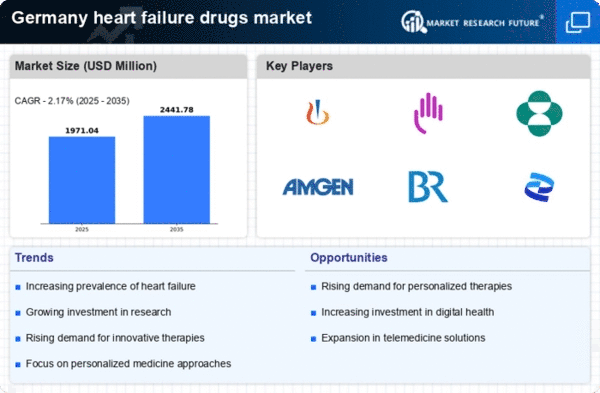Rising Healthcare Expenditure
The rising healthcare expenditure in Germany is a significant driver of the heart failure-drugs market. With healthcare spending projected to reach approximately €500 billion by 2025, there is a growing emphasis on investing in effective treatments for chronic diseases, including heart failure. This increase in expenditure allows for greater access to advanced therapies and medications, which is essential for managing heart failure effectively. Additionally, as healthcare budgets expand, there is a potential for more comprehensive insurance coverage for heart failure treatments, further stimulating market growth. The heart failure-drugs market stands to benefit from this trend, as increased funding translates into improved patient care and access to innovative therapies.
Growing Awareness and Education
There is a notable increase in awareness and education regarding heart failure among both healthcare professionals and the general public in Germany. Campaigns aimed at educating patients about the symptoms and management of heart failure have led to earlier diagnosis and treatment. This heightened awareness is reflected in the growing number of patients seeking medical advice, which in turn drives the demand for heart failure medications. Healthcare providers are also more informed about the latest treatment guidelines, leading to better prescribing practices. Consequently, the heart failure-drugs market is benefiting from this trend, as more patients are initiated on appropriate therapies, thereby increasing overall market consumption.
Advancements in Drug Development
Technological advancements in drug development are significantly impacting the heart failure-drugs market. The integration of artificial intelligence and machine learning in research and development processes has accelerated the discovery of novel therapeutic agents. In Germany, pharmaceutical companies are increasingly investing in research, with expenditures reaching approximately €5 billion annually. This investment is aimed at developing targeted therapies that address the underlying mechanisms of heart failure. As a result, the market is witnessing a surge in innovative drugs that offer improved efficacy and safety profiles. These advancements not only enhance treatment options but also attract investment, further propelling the heart failure-drugs market forward.
Government Initiatives and Funding
Government initiatives aimed at improving cardiovascular health are playing a crucial role in shaping the heart failure-drugs market. In Germany, public health policies are increasingly focused on reducing the burden of heart disease through funding for research and development of new treatments. The government has allocated substantial resources, with an estimated €1 billion dedicated to cardiovascular health initiatives over the next five years. These efforts not only support the development of innovative drugs but also enhance access to existing therapies for patients. As a result, the heart failure-drugs market is likely to experience growth driven by both increased funding and improved patient access to necessary medications.
Increasing Prevalence of Heart Failure
The heart failure-drugs market is experiencing growth due to the rising prevalence of heart failure in Germany. Recent statistics indicate that approximately 1.5 million individuals are diagnosed with heart failure, leading to a heightened demand for effective treatment options. This increase in patient population necessitates the development and availability of innovative drugs, thereby driving market expansion. Furthermore, the aging population in Germany, with a significant proportion over 65 years, contributes to the growing incidence of heart-related conditions. As healthcare providers seek to manage this chronic condition effectively, the heart failure-drugs market is likely to see sustained growth, with an emphasis on new therapies that can improve patient outcomes.
















